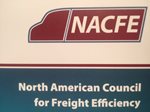
I have just attended a conference in Indianapolis, Indiana with the North American Council for Freight Efficiency (NACFE). This organization includes freight carriers, owner operators, vendors, fleets,
 |
maintenance personnel, truck dealers and truck manufacturers. NACFE is a nonprofit organization dedicated to doubling the fuel efficiency of the freight transportation industry. The members collect, distribute and share information among one another throughout the year. I was invited to their trucking efficiency workshop to appear on a panel to discuss my experience in reducing fuel costs. The event was held at the Auto Research Center with approximately sixty people in attendance. This was my first visit to the Center and I was like a kid in the candy store. The facility conducts various testing and research for automotive manufactures, race teams, truck and trailer manufacturers and more. My visit was a thrill as I met with race people and truck people all in the same building. We all seemed to be like minded when it comes to sharing our passion for the transportation industry and basically anything that has wheels regardless if it runs on the highway or speedway.
 |
During our meeting sessions, attendees discussed what was working for them in regards to fuel efficiency and operational costs. The vendors who participated took the opportunity to bring forth new and upcoming products which are currently in progress. This was not a sales event however it was more of a day to share ideas, successes and failures. The conversation was very civil even when their ideas were in direct opposition of one another. Tables were set up with various topics to discuss as attendees rotated around to each table for a period of fifteen minutes. In addition to the table discussion, a panel was seated in the front of the room in which participants could ask questions from the chosen panel members. The discussion was moderated by Jack Roberts with CCJ magazine. I was on the panel with Larry Adkins, Jim Sharkey and Sam Waltzer.
While on the panel, many questions were asked and one of them really stood out and in fact has been on my mind since the conference. The question was now that fuel is dropping below $2.00 per gallon in
 |
many areas, is all the investment in aerodynamics and advanced technologies worth it?” Basically, is the return on investment worth it? I was more than happy to answer this question. My response was to share that if we look at history, we realize that we have been down this road before. When fuel prices sky rocket to record highs the public and industry respond by conserving fuel. When fuel prices drop, interesting conservation wanes. At this point energy use goes up increasing the demand and prices begin to increase once again. The point I’m trying to make is that if we want fuel prices to stay low, we must stay ever vigilant in our fuel efficiency measures. You may not be able to put a direct figure on the return on investment when fuel prices are low as it’s hard to quantify. The question is how much does being fuel efficient contribute to keeping the actual fuel price low?
If you get a chance, check out NACFE as they are a great group of people, forward thinking with a CAN do attitude. I wish to thank them for inviting me to participate in this event.